Pathological Empathy---It's Not Your Job to Feel Everything for Your Clients
Let’s talk about pathological empathy.
Most of us got into this work because we feel deeply. We care. We track the nuance of human suffering. We want to meet people in their pain, not bypass it.
When empathy gets entangled with over-responsibility, leaky boundaries, or unresolved trauma patterns in us, it stops being a gift and starts becoming a liability. Not just for us—but for our clients.
So what is pathological empathy?
It’s empathy that comes at a cost to your integrity, clarity, capacity, or regulation. It’s the kind of empathy that throws you into merging or rescuing, makes you feel everything for your client, or it’s empathy that your nervous system registers as their life happening to you.
It renders you ineffective in actually supporting them.
It’s not the same as compassion.
It’s not the same as attunement.
It’s an over-identification. A collapse of differentiation.
And often, it’s an old survival strategy.
The Nervous System Knows
In SomaField, we talk a lot about nervous system literacy—and here’s the thing: pathological empathy involves some level of dysregulation. Hypervigilance. Collapsing. Fawning. Maybe people pleasing. The practitioner loses access to their center because they’re overly attuned outward or maybe their nervous system isn’t adaptable enough to choose not to co-regulate to a dysregulated client.
Your nervous system starts scanning their overwhelm as your emergency.
And while that might’ve helped you survive in early relationships, it’s not actually helping your client now.
It’s Not Your Job to Feel Everything
One of the unspoken myths in our field is that the more deeply you feel your clients’ pain, the better a practitioner you are.
But that’s not true.
Your job isn’t to feel it all for them. Your job is to feel what’s yours, sense what’s theirs, and use the space in between to offer clarity, containment, and care.
Sometimes that means not merging with their grief.
Sometimes that means not indulging their conclusions about their situation.
Sometimes that means not tracking every micro-fluctuation in their tone or body.
Sometimes being truly empathic means staying grounded when they can’t. It means holding perspective when they’re drowning in emotion. It means finding the ground and holding steady to help teach their system how to find it.
It requires you knowing how to stay in a parasympathetic state as a beacon for them.
This is what we mean in SomaField when we say you are the instrument. You’re not meant to blur into your client’s field—you’re meant to stay attuned as yourself. With a body. With sensations. With a spine. As regulated as you can be, both for yourself and for them.
Pathological empathy isn’t a moral failure but chances are good it was a survival strategy that’s now keeping you less adaptable in the face of unpleasantness or prone to feeling too much. This might be a wake-up call to do some nervous-system-supportive work for yourself.
Let me know if this lands. And if you’ve had your own unlearning around this one—I’d love to hear about it.




